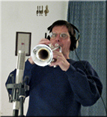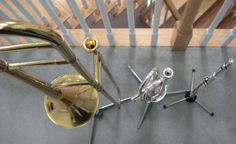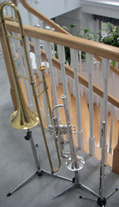David on Musical Instrument Doubling
Playing the Flute and Trumpet
I’m often asked about playing both the trumpet and the flute.
The most frequent question has to do with how one embouchure affects another. Many people assume that playing the flute can be detrimental to the trumpet embouchure or vice-versa.  I have seen no ill effects on either the trumpet embouchure or flute embouchure from playing both the flute and trumpet. I have no trouble going from one instrument to the other. In performance, I sometimes switch instruments, going from trumpet to flute or flute to trumpet, in the middle of a piece. This presents no problem at all.
I have seen no ill effects on either the trumpet embouchure or flute embouchure from playing both the flute and trumpet. I have no trouble going from one instrument to the other. In performance, I sometimes switch instruments, going from trumpet to flute or flute to trumpet, in the middle of a piece. This presents no problem at all.
The two embouchures, the flute embouchure and the trumpet embouchure, are certainly different and both need to be developed and maintained through consistent practice.  That is probably the most difficult part of any instrumental doubling, finding time to consistently practice all of your instruments. The old joke, “I used to play the trombone, but I let it slide”, applies.
That is probably the most difficult part of any instrumental doubling, finding time to consistently practice all of your instruments. The old joke, “I used to play the trombone, but I let it slide”, applies.
It is true that, from an embouchure standpoint, if you are a wind player who is selecting a double, it is easier to choose an instrument that is in the same family as the one you currently play. If you are a trumpet player, for example, it is easier to maintain a trombone, French horn, tuba or other brass instrument embouchure than it is to develop and maintain a flute embouchure.
Playing the Trombone and Trumpet
 I also occasionally double on the trombone. Naturally, since the trombone is a brass instrument, the trombone embouchure is similar to the embouchure used to play the trumpet. A trombone player uses the same lip buzzing technique to get a sound from the trombone as is used to get a sound from the trumpet.
I also occasionally double on the trombone. Naturally, since the trombone is a brass instrument, the trombone embouchure is similar to the embouchure used to play the trumpet. A trombone player uses the same lip buzzing technique to get a sound from the trombone as is used to get a sound from the trumpet.
When I graduated from music school, the first trombone I bought was a Conn 88H, which I played for several years. Although, this is an excellent instrument, ultimately, it proved to be too large for me, as a trumpet player, to comfortably play. My current trombone is a King 2B+. This instrument is very well suited to a trumpet player who is doubling on the trombone. The King 2B+ is light and open and it blows in a similar manner to the trumpet. (By the way, the plus sign at the end of the King 2B model number simply indicates that this model trombone has a slightly larger bore size than the King 2B)
If you’re a trumpet player pursuing a trombone double, besides selecting the right trombone, you should also carefully consider the type of mouthpiece you use for the trombone. Again, I started with a mouthpiece that was too big. I finally settled on a Dennis Wick 10CS trombone mouthpiece. The one I use is gold plated. The gold plated trombone mouthpiece just feels more comfortable to me.
The Advantages of Instrumental Doubling
If you enjoy recording music, as I do, you’ll find that being a multi-instrumentalist definitely has advantages. You can use your ability to double to create large ensemble recordings, through multi-track recording, or simply as a way to provide more tone colors to your recordings.
 As a multi-instrumentalist you will likely find more opportunities for performance as well. I’m sometimes hired as a trumpeter only or as a flutist only (flautist, if you prefer). However, often people are glad to find that I can play both flute and trumpet and are happy to have me utilize that ability. The combination of trumpet and flute in my specialized performance work is especially effective.
As a multi-instrumentalist you will likely find more opportunities for performance as well. I’m sometimes hired as a trumpeter only or as a flutist only (flautist, if you prefer). However, often people are glad to find that I can play both flute and trumpet and are happy to have me utilize that ability. The combination of trumpet and flute in my specialized performance work is especially effective.
If you currently are, or plan on becoming, a professional performing musician there is a monetary value to being able to play more than one instrument in some situations. Instrumental doublers who use their ability by playing two or more instruments at a recording session, are paid a differential for this service. The same applies to musicians playing in a pit orchestra for a musical.
Music Teaching and Instrument Selection
When I was a band director and instrumental instructor giving instrumental instruction on all band and orchestra instruments, I quickly found that students were much more likely to stay with an instrument when given their first choice of which instrument they’d like to play. School band and orchestra directors should make every effort to allow students to play their first choice of instrument. As a music teacher, I often made extensive edits to existing band arrangements, and wrote my own custom arrangements to accommodate the instruments at hand, rather than persuading students to change their instrument of choice.
Certain fundamental musical concepts apply when playing any wind instrument. These include, embouchure development, breathing, pitch, articulation (tonguing), ear training, range, tone, technique (digital dexterity) and flexibility. More advanced concepts include double tonguing and transposition. A good private lesson music teacher should be able to clearly explain all of these concepts as well as be able demonstrate their practical application.
I believe that you should play the instruments that interest you and not be concerned about how one wind instrument embouchure might affect another. If you select instruments on the basis of those that you truly enjoy playing you will be more likely to keep playing and enjoying the enormous satisfaction that comes from making music.
See more information on taking quality private trumpet lessons or private flute lessons from experienced instrumental doubler David Summer.